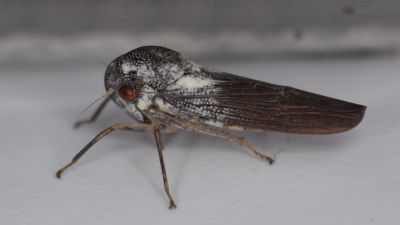Shape of rare insect's penis leads Cambridge scientist to 'once-in-a-lifetime' discovery in Uganda

A scientist from Cambridge has identified a new rainforest insect so rare that its type has not been seen since the 1960s.
The new type of leafhopper was found in Uganda by Dr Alvin Helden, from Anglia Ruskin University, when he dragged a net through undergrowth at Kibale National Park in Uganda.
He identified the male Phlogis kibalensis leafhopper from unusual shape of its reproductive organs, which have a bit that looks like "little leaves" at the tip.
The rare bug is just 6.5mm or around a quarter of an inch long.
Prior to the new discovery, made in 2018, the last recorded sighting of a leafhopper from the rare genus was in the Central African Republic in 1969.
Dr Helden said many different species of leafhopper "look very similar, so from the outside it's very difficult to tell which they are".
"So the way we have to do that is to actually look at the male genital structures, and you find that their genital structures have unique shapes," he said.
"Often they're quite intricate and sometimes quite bizarre in shape. This particular species has its own unique shape.
"Insects have external skeletons and the male reproductive structures - the equivalent of what we would call a penis - of course has to be inserted in to the female," he said.
"The male structure has got to be just the right shape to go in to the female.
"Each species, in order to reproduce successfully, has to have its own structures."
Leafhoppers feed mainly on plant sap and are preyed on by invertebrates, including spiders, beetles, and parasitic wasps, as well as birds.
Dr Helden, a member of the Applied Ecology Research Group at ARU, said: "To find this new species is a once-in-a-lifetime achievement, particularly as its closest relative was last found in a different country over 50 years ago."
He added: "Being able to look down a microscope and think, 'I'm the first person ever to have seen this,' - that's quite exciting.
"In life, there's not many things that you can say 'I'm the first person to ever do this.'"
Dr Helden said it was sad to think that some species could become extinct before we have even discovered them.
"There are some wonderful places, like the Kibale National Park in Uganda, where wildlife will survive. But outside national parks and reserves, the amount of rainforest that has been cleared in the tropics is devastating," he said.
"Rare species could be living anywhere, but deforestation means it is inevitable that we will be losing species before we have discovered them."
The specimen found by Dr Helden will now be deposited in the Museum of Zoology at the University of Cambridge.